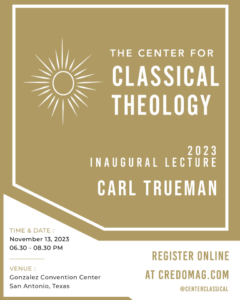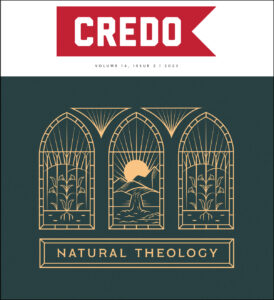 David VanDrunen is a professor, ethicist, theologian, and minister. Additionally, he has written extensively on concepts such as the natural law, the two kingdoms, and a Christian’s role in the public square. In this short and introductory interview, Dr. VanDrunen held a discussion with Credo’s executive editor, Timothy Gatewood. During their conversation, VanDrunen addresses natural law and its relationship to natural theology, the Reformed doctrine of total depravity, John Calvin’s sensus divinitatis, and a practical use of natural law for Christians today. David VanDrunen’s succinct definitions and accessible overview will prove helpful to readers – whether they are skeptical of the existence of natural law, have held a longtime commitment to the concept, or have never heard of natural law until today.
David VanDrunen is a professor, ethicist, theologian, and minister. Additionally, he has written extensively on concepts such as the natural law, the two kingdoms, and a Christian’s role in the public square. In this short and introductory interview, Dr. VanDrunen held a discussion with Credo’s executive editor, Timothy Gatewood. During their conversation, VanDrunen addresses natural law and its relationship to natural theology, the Reformed doctrine of total depravity, John Calvin’s sensus divinitatis, and a practical use of natural law for Christians today. David VanDrunen’s succinct definitions and accessible overview will prove helpful to readers – whether they are skeptical of the existence of natural law, have held a longtime commitment to the concept, or have never heard of natural law until today.
____________________________________________________________________________________
1. What is natural law and how is it distinguished from natural theology? Can a consistent thinker affirm one without the other?
To answer this question, I believe it’s helpful first to affirm the idea of natural revelation: through the created order, God reveals both his basic moral will for human beings and his own existence and nature. The former is natural law. When human beings reflect on this natural law and make claims about it, we might call this natural law theory (or perhaps natural law ethics). When human beings reflect on and make claims about the latter, the natural revelation of God’s existence and nature, they’re doing natural theology. So, you might note that natural law and natural theology are closely related, but there’s a very important difference between them. Natural law is objective; that is, it refers to God’s revelation and is thus independent of my existence or my theorizing about it. But natural theology is subjective; that is, natural theology is a human activity that reflects on and makes claims about God’s revelation of his existence and nature in the created order.
2. In your upcoming book Natural Law: A Short Companion, you state that “without natural law, Christianity would not make sense. The nonexistence of natural law would throw Christian claims about God, the gospel, and the moral life into disarray.” Why is natural law such a load-bearing concept?
If we live in a morally orderly world, then rebelling against the natural law cuts against human nature and against the way the world works. Click To Tweet I realize that that statement of mine may strike many people as an exaggeration when they first read it. But it’s remarkable how much traditional Christian doctrine presumes the idea of natural law. You may not always see natural law on the surface, but it’s a crucial part of the infrastructure of Christian theology. To simplify, I would point out that human responsibility before God is fundamental to Christianity. No one would deny that. Yet a great many human beings throughout history have never been confronted with God’s special revelation. Such people can be accountable to God only if they know his will through another means—that is, through the natural law. Hence, natural law explains why the evil conduct of all people is actually sin, it explains why the preaching of the gospel is relevant and intelligible to all people, and why God is just in calling all people before his final judgment. There’s certainly much more that could be said, but this is one basic reason why natural law is such a “load-bearing concept,” as you put it.
3. But what about the Reformed emphasis of total depravity? Isn’t the created order corrupted by the Fall? If man is totally depraved, and the created order is corrupted, then how can fallen man know moral truth through creation?
Some of these critics confuse natural law itself from natural law theory. Because of sin, human beings will inevitably err when reflecting on and interpreting natural revelation. Hence, all natural law theories (and all natural theologies) are fallible. But the fall doesn’t change the fact that God reveals his law in the created order and that human beings are accountable to him for their response to this revelation. That gets to the core concern about why a doctrine of natural law is a crucial part of Christian theology. On the one hand, a biblical doctrine of sin means that we can’t be naively optimistic about the moral reasoning of non-Christians. On the other hand, the doctrine of common grace is also important. God preserves human intellectual faculties and enables many non-Christians to make correct and insightful moral judgments, a fact we can be thankful for every day we live in this world. To put these two concerns together, we might say that natural law will never bring us anything like utopia, but it does play an important preservative function in God’s providential government of this sinful world.
4. To some, it may seem strange to critique natural law or natural theology at all. Are these not simply ways of describing natural revelation? If someone affirms natural revelation, must they also affirm natural law and natural theology?
This gets back to my answer to the first question. Those who affirm natural revelation are simultaneously affirming natural law, since natural law is one aspect of natural revelation. A person could technically affirm natural revelation but not affirm natural theology: that would entail saying that God reveals his existence and nature in the created order but human beings have no ability to understand or interpret that revelation. That would be a caricature of the biblical doctrine of sin, however (even in its strong Reformed sense, which I affirm). Romans 1 not only affirms the reality of natural revelation (1:20) but also says that rebellious human beings actually know God through this revelation (1:21) and know that their sins deserve judgment (1:32). One way to think about these things is this: Natural revelation and natural theology both exist, but while natural revelation is infallible, natural theology is fallible.
5. The terms “natural law” and “natural theology” are not found in Scripture. Are these concepts grounded in exegesis, or are they non-biblical metaphysical claims? If we must use Scripture to prove the existence of natural law, does that not, paradoxically, weaken the case for it?
These are thoroughly biblical ideas. We find them explicitly in some biblical texts, such as Romans 1:18-32, mentioned above. We also find them implicitly elsewhere in Scripture. To mention just a handful of examples: the creation accounts describe a world that’s orderly and purposeful (Gen 1-2), God’s people have meaningful moral interaction with unbelievers (e.g., Gen 20), the psalmist states that the heavens declare God’s glory (Ps 29:1), Proverbs draws a great deal of its wisdom from observation of how this world works, and the Old Testament prophets held Gentile nations accountable for their wickedness (e.g., Amos 1:3-2:3). It’s also true that natural-law theory and natural theology make philosophical claims, and natural lawyers and natural theologians often make truth claims by appealing to created reality. The truths about the natural revelation of God’s nature or God’s law don’t depend on Scripture. In fact, God was revealing himself in nature long before Scripture even existed! But I don’t know why any Christian would think that appealing to Scripture to help us understand natural law or natural theology would weaken the case for them. On the contrary, Scripture gives us great confidence that truth is revealed in the created order and that it’s profitable to reflect on it humbly. Natural and special revelation are complementary and mutually illuminating. Scripture helps us to interpret nature rightly, and interpreting Scripture depends on knowledge we’ve gained from the created order (e.g., Scripture presumes we know what the sun, moon, and stars are, where the Jordan River is, and what horses do).
6. Some claim 21st century America is growing increasingly post-Christian (some may even use the word “pagan”). Does the lack of common morality weaken the case for natural law? If man can know the moral law through creation, why do we not see a stronger moral consensus today?
The fact that a particular person or culture takes a certain moral direction has no bearing on the reality of natural law. Sinful human beings both know God’s law by nature and they suppress this knowledge, and to what degree they adhere to God’s moral law varies from individual to individual, from society to society. The moral and cultural changes in recent American society do provide an interesting test case for a Christian view of natural law, however, if we look at matters from a different direction. If traditional Christian claims about natural law are true, we’d expect rebellion against the natural law to have tragic consequences. In other words, if we live in a morally orderly world, then rebelling against the natural law cuts against human nature and against the way the world works. That shouldn’t end well. So, it’s fair to ask how things are going under our new prevailing American morality. We see so much family breakdown, alarming rates of depression among young people, and rising numbers of drug overdoses, to name a few prominent developments. This is evidence for the reality of natural law. It’s going to be destructive if we pretend to be something other than the kind of creature God made us.
7. Have Protestants historically made use of natural law or is it primarily a Roman Catholic concept?
There’s been a considerable amount of research and writing on historical Protestant views of natural law over the past couple of decades. The results are in and the evidence is overwhelming: Protestants affirmed natural law as a standard part of Christian theology and ethics. The Reformers and their heirs believed that many aspects of medieval thought and practice needed to be reformed, but not all of them. They didn’t reject the classical doctrines of the Trinity or Christ’s two natures in one person, for example. They took a similar attitude toward natural law.
8. Is natural theology different than John Calvin’s sensus divinitatis? Are the two concepts mutually exclusive (i.e., must Protestants believe either one or the other)?
We’re being true to ourselves as Christians when we creatively draw on natural evidence for moral truth in the public square, and we never know how God might use those efforts to constrain sin. Click To Tweet Natural theology is a broader concept than Calvin’s idea of the sensus divinitatis, but I think it’s accurate to say that Calvin’s discussion of the sensus divinitatis early in his Institutes of the Christian Religion was a kind of exercise in natural theology. Calvin believed that God had inscribed a sense of his existence in the hearts of all people. Calvin also believed that God had placed many testimonies to himself in the external world all around. For Calvin, sinful people know God even before they’ve heard Christian preaching, and they can’t ultimately shake it no matter how much they resist. The sensus divinitatis also means that when people hear Christian preaching and believe it, they don’t accept it as entirely new. Christian truth corresponds to and confirms things they already knew of God simply by virtue of being human. I say that Calvin’s discussion was an exercise in natural theology because he was reflecting on God’s revelation of himself in nature and on its consequences.
9. Practically, how should natural law affect Christians’ practices in their civil communities?
The fact that all people are confronted by God’s law every day of their lives, simply by virtue of being human beings living in this world, should give Christians confidence that when they appeal to moral truths in the public square, all people, whether they admit it or not, know that such appeals are correct. That’s one reason why Christians shouldn’t be ashamed or fearful to affirm what’s right. The reality of natural law should also encourage Christians to think creatively when they try to engage non-Christians on civil issues. Christians may feel good about themselves when they cite Scripture in support of their positions in contentious political debates, but I fear that’s often counter-productive. If our only arguments against abortion, for example, involve appeals to biblical verses, we send the not-so-subtle message that being pro-life is simply a Christian thing. But it’s not. It’s a human thing. Whether my neighbors are Christian or not, I want them to be pro-life. They ought to be pro-life. So, let’s try to prick their consciences by bringing out all the evidence at our disposal. Natural revelation provides a great deal of it. Of course, there’s no guarantee that people will heed our appeals to evidence from nature (any more than there’s guarantee that people will agree with arguments we make through biblical exegesis). But the point is that we’re being true to ourselves as Christians when we creatively draw on natural evidence for moral truth in the public square, and we never know how God might use those efforts to constrain sin.
10. If readers wanted to know more about natural law or natural theology, where should they turn to next?
To read some primary sources on early Protestant natural theology, one might look at John Calvin, Institutes of the Christian Religion, 1.3-5 or at Franciscus Junius (who lived from 1545-1602), A Treatise on True Theology, trans. David C. Noe (Grand Rapids: Reformation Heritage, 2014). I’ve tried to describe developments and debates about natural theology in the Reformed tradition in “Presbyterians, Philosophy, Natural Theology, and Apologetics,” in The Oxford Handbook of Presbyterianism, ed. Gary Scott Smith and Paul C. Kemeny (Oxford: Oxford University Press, 2019), 457-73.
Junius also provides a useful primary source on early Protestant views of natural law, in the context of a broader theology of law, in The Mosaic Polity (Grand Rapids: Reformation Heritage, 2015). For historical studies of natural law in Protestantism (especially the Reformed tradition), see Stephen J. Grabill, Rediscovering the Natural Law in Reformed Theological Ethics (Grand Rapids: Eerdmans, 2006) or David VanDrunen, Natural Law and the Two Kingdoms: A Study in the Development of Reformed Social Thought (Grand Rapids: Eerdmans, 2010).
If readers are interested in my own constructive theological account of natural law, they could see either my Divine Covenants and Moral Order: A Biblical Theology of Natural Law (Grand Rapids: Eerdmans, 2014), which is a big academic volume, or a shorter and simpler treatment, Natural Law: A Short Companion (Nashville, B&H Academic, forthcoming), which will be published in Fall 2023.



